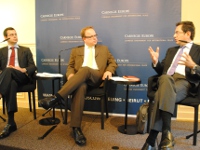Registration
You will receive an email confirming your registration.
IMGXYZ3068IMGZYXTurkey's parliamentary elections in June will be decisive for the country’s future. The ruling Justice and Development party (AKP) has led the polls and is widely expected to win the elections for the third time. An AKP win could mean a new constitution and could possibly affect EU accession plans and Turkey’s evolving regional role.
Carnegie’s Sinan Ülgen was joined by Kadri Gürsel, columnist for Turkish daily newspaper Milliyet, to discuss the issues dominating the debate and the elections' potential implications for Turkish foreign policy. Carnegie’s Jan Techau moderated.
Seeking the Parliamentary Majority
Turkey’s ruling Justice and Development Party (AKP) is, short of a cataclysmic event, certain to win the upcoming elections, Ülgen explained. What is really at stake is the margin of victory the AKP will attain, since Prime Minister Erdogan has made clear that he is seeking the parliamentary majority necessary to change the constitution and establish a presidential political system in Turkey.
Possible Constitutional Amendments
- Potential Scenario: If the AKP were to attain a two-thirds majority of the seats in parliament, it would be in a position to unilaterally change the Turkish constitution, a move that some would see as hijacking the constitution, Ülgen added.
- Likeliness: The more realistic scenario would be for the AKP to seek to attain a majority of 330 seats in parliament, which would enable it to force a referendum on amending the constitution.
If Parliamentary Majority is Not Met
Should the AKP attain less than 330 seats in parliament it would lack the ability, either by itself or through forcing a referendum, to change the constitution. This, Ülgen said, would be a good thing for Turkish democracy and would oblige the AKP to enter into substantive negotiations with the rest of the Turkish body politic on potential constitutional amendments.
The Opposition
- Main Opposition: The Republican People's Party (CHP), will be important to watch throughout this electoral period, Ülgen said. The CHP has traditionally been a politically conservative party, wedded to the idea of the sanctity of the state.
- New Leadership: However, the party now has a new leader and has engaged in significantly more liberal rhetoric. It will be interesting to see if the Turkish people back this new vision in the elections.
A Broad-based Alliance
Should the CHP achieve a positive result on Sunday, Ülgen said, it would provide Turkey with the first opportunity in recent memory to create a broad-based political alliance that could promote an ambitious agenda of democratic reform and improved relations with Europe.
